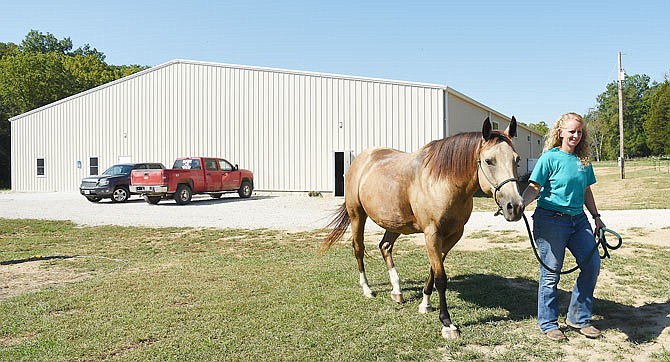Amy DeCramer knew when she studied equine science in college that she wanted to use her degree and her love of horses to help children with disabilities.
DeCramer started Healing Horses Therapeutic Riding Program, outside Linn, 12 years ago. She began with programs serving able-bodied and disabled children. About a year ago, she began a program to serve veterans.
Healing Horses' latest program, serving foster children recovering from trauma, is set to begin Monday.
A friend recently took in four foster children, DeCramer said. The children had suffered from physical abuse, possibly sexual abuse and certainly mental abuse, she said.
They were struggling to cope with their new lives, and their foster parents were having a hard time getting through to them, DeCramer said.
One little boy wasn't showing emotion or empathy - things he possibly had never experienced.
"We brought them down here - just for fun, just to let them see the horses and get to know them," DeCramer said. "They got to start grooming. We led them around on the horses."
The boy really liked his horse and liked riding but kept looking out into the pasture.
"Who is that horse?" he asked.
"That's Shaq," she told him.
Shaq is big - 18 hands, which is 6 feet at the withers, or the highest part of a horse's back. Healing Horses had received the coal black Percheron from the Draft Horse Rescue Resource during the winter. He was skinny - malnourished.
DeCramer told the boy Shaq kind of had a rough life. He'd been abused. However, she and other staff members were going to start training him for the program.
"I want to ride him," the boy said.
None of her young clients had gotten to ride the horse, but she decided to halter Shaq and let the boy play with him.
"They got nose to nose, and (the boy) had his face up to this gigantic horse's nose," DeCramer said. "He whispered, 'I'm never going to let anybody hurt you again.' And I cried."
It was the first time the foster parents had seen the boy show emotion.
Shaq has been the boy's horse ever since. They've bonded, she said. The boy loves Shaq and rides him. The boy's foster parents try to take him to Healing Horses a couple of times a month.
"I noticed then that this could be huge for kids who have been in trauma," DeCramer said. "Not necessarily for kids with disabilities, but trauma-focused. That's what started it. I knew this is what I wanted to do."
A Healing Horses board member contacted the local foster care organizations.
As soon as they started talking about it, folks in the community began contacting DeCramer about children they wanted in the program.
DeCramer set a goal to have six children each year.
Two enrolled children will begin sessions Monday, and four more will start in three weeks.
A donation from Jim Butler Auto Group in Linn will allow Healing Horses to operate the new program for free.
At the end of August, the automotive group announced it would donate $100,000 to support the foster children's program and assist it with veterans and other programs.
Brad Sowers, a co-owner of the auto group, said the dealership took a long look at a number of organizations. A couple of employees in the Jim Butler Linn Chevrolet dealership have children who participate in Healing Horses, he said.
"We got a chance to talk with (DeCramer) and speak about what she does," Sowers said. "They do a great job. Every single person who uses their services loves them."
Sowers said his visit to Healing Horses was astonishing. A strategy throughout the auto group is to hire veterans, he added.
"We employ a lot of veterans," Sowers said. "I was surprised when we went to visit. I was thinking it was only kids. Apparently it's a great program for veterans, too."
Funding that comes in through the Missouri Department of Economic Development-Neighborhood Assistance Program allows Healing Horses to offer veterans therapy and foster care services for free, DeCramer said.
Through the assistance program, the auto group will receive a 70 percent tax credit.
The assistance program also helped the facility build a 15,000-square-foot arena that opened this spring. Between the program and a 2017 capital campaign, Healing Horses raised more than $400,000 necessary to build the metal structure.
Under the roof of the building stands an office area that includes two handicapped-accessible restrooms, a play area for small children and a viewing area for parents.
A wash bay stands next to the 90- by 100-foot indoor arena. Cross-ties and a tack area line one wall. Horse stalls line another wall.
An electric hoist can be used to lift wheelchair-bound clients on and off horses.
"They bring their wheelchair over, and I put a sling around them," DeCramer said. "The lift lifts them all the way up, moves them over and puts them on the horse. When the rider's done, we hook them up, lift them up and put them back in the wheelchair."
The entire building is heated, so therapeutic lessons can continue during cold weather.
"We can provide lessons year round," she said. "This is the first year we'll be able to do that for all of our kids."
The therapy is just like exercise, she said, in that if it stops progress is lost and has to begin again.
During 12 years, Healing Horses has grown from two horses to 22. It went from two students to 56. The addition of veterans and the need to support larger children has spurred DeCramer to seek draft horses large enough to carry those clients.
She realized Shaq wouldn't have been in the pasture if not for the growth of Healing Horses programming.
As she's developing the new program for foster children, DeCramer said, her opportunities are broadening.
"It just opened my eyes," she said. "We can do a lot more than just the therapeutic side with disabilities."

